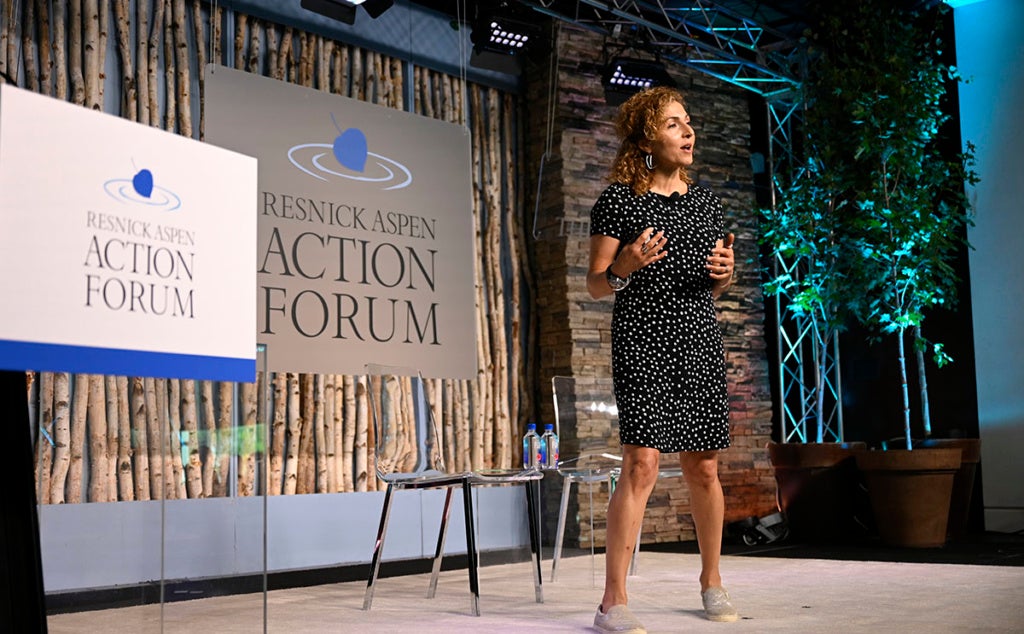When Anousheh Ansari was seven years old, she drew a photo of a rocket flying through space and set her eyes on being an astronaut when she grew up. However, there was no space program in Iran at the time and the chances of Ansari becoming an astronaut were slim.
“I like to prove people wrong,” said Anousheh Ansari on stage at the 2019 Resnick Aspen Action Forum. On September 18, 2006, Ansari became the world’s first female private space explorer to travel and stay onboard the International Space Station for over a week.
“This is the gift we have as human beings — we imagine it and build it. We imagine things that do not exist; we invent them.” @AnoushehAnsari discusses fulfilling her childhood dream of space travel at the Resnick @AspenAction Forum: https://t.co/O2dVobkR3L #AspenAction pic.twitter.com/x4KRGl0qsN
— The Aspen Institute (@AspenInstitute) July 25, 2019
Ansari, a Middle East Leadership Initiative Fellow at the Aspen Institute, shared her passion for exploring beyond borders and cultivating leaders that are not afraid to push boundaries.
While in space, Ansari recalled looking out the window of the Space Station to see planet Earth. “You don’t any see lines. You don’t see any borders. There is nothing that divides us. It’s all in our head, and if we can see the world through this lens…it is transformational,” she said.

As the world continues to innovate and technology advances to allow for things like gene editing and advanced military equipment, Ansari emphasized the importance of values and ethical decision-making while developing new technology. Rapid growth is common in the technology sector, and it is important to understand the impact that technological advances can have –– for better or for worse.
Ansari closed her talk reminding the audience that everyone has a responsibility to use and create technology for good. “We have to have courage to ask the hard questions, not to be satisfied with the status quo, not to be satisfied with the answers that people expect from us, but to push those boundaries…and be able to come up with answers that will benefit humanity,” she said.
Following Ansari’s talk, Jane Sun and David Rubenstein took the stage to discuss Jane’s career path and how she continues to discover and challenge borders. Sun is the CEO of Ctrip.com, the largest online travel agency in China, and a Fellow of the China Fellowship Program.
Sun talked about the opportunities that opened up as she pursued her education. “My generation was so fortunate because when I went to elementary school, the Cultural Revolution ended,” she said. Sun talked about pursuing her studies in the United States and the generosity her professors showed by opening up their homes for her to stay with them while she was a student at the University of Florida. The only thing Sun’s professors asked for in return was for her to pay the good deed forward, and as a result, Sun established a scholarship that helps international students receive an education and named it after the professors.
During the one-child policy era in China, Jane Sun would pay her employee’s fees when they had more than one child. Now, she covers the costs for her employees who want to freeze their eggs: https://t.co/7OrfSxAjmG #AspenAction pic.twitter.com/hIUxExk6AM
— The Aspen Institute (@AspenInstitute) July 25, 2019
As the only woman running an internet-related company in China, Sun has built Ctrip.com into what it is today. She shared her vision to bring people together through travel and to promote positive cultural exchanges. She also talked about Ctrip.com’s choice to take a stand against China’s one-child policy. While the policy was in effect, Ctrip.com would pay the penalty for any employee that had more than one child. Now, the one-child policy is no longer in effect; however, Sun continues to support employees –– especially women –– by paying for oocyte cryopreservation, or egg freezing. The company benefit, Sun explained, allows women to map out opportunities like education while still having the option of raising a family later in life.
One thing is clear, both of the women that took the stage at the 2019 Resnick Aspen Action Forum have dedicated their lives to exploring the frontier of human compassion and the space beyond the borders that society builds around us.

